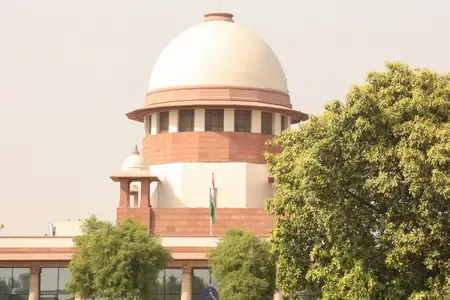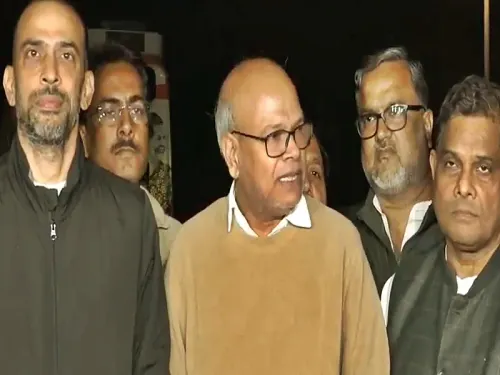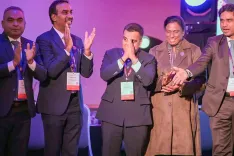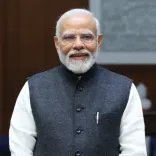Did the SC Reject the PIL on Electoral Roll Irregularities?

Synopsis
Key Takeaways
- The Supreme Court declined to consider a PIL on electoral roll irregularities.
- The petitioner was advised to approach the Election Commission of India.
- The PIL alleges multiple registrations of voters across constituencies.
- Concerns raised about the integrity of the electoral process.
- Claims of significant numbers of invalid and duplicate voters identified.
New Delhi, Oct 13 (NationPress) The Supreme Court on Monday declined to consider a public interest litigation (PIL) that claimed significant irregularities in electoral rolls across various states. A Bench comprising Justices Surya Kant and Joymalya Bagchi advised the petitioner to address the matter directly with the Election Commission of India (ECI).
In reply, the petitioner’s legal representative pointed out that a formal complaint had already been lodged with the electoral body regarding the discrepancies in the voters’ list, yet they have received “no effective action or response.”
Nonetheless, the apex court chose not to entertain the public interest plea, indicating that the petitioner should seek lawful remedies available to them.
The PIL sought prompt judicial intervention to safeguard the integrity of the electoral process and maintain the constitutional principle of “one person, one vote.” According to the petition, “the names of identical voters have been discovered registered across multiple constituencies, which blatantly violates the provisions of the Constitution of India.”
The petition, submitted through advocate Kausar Raza Faridi, highlighted specific cases where individuals were found registered in multiple constituencies nationwide.
For instance, one voter is reportedly registered in Mahadevapura (Bengaluru), Lucknow East, and Jogeshwari East (Maharashtra). Similarly, another person is simultaneously registered in both Mahadevapura and Varanasi Cantonment constituencies.
“The EPIC number given by the Election Commission of India is uniquely assigned to an individual, yet in this case, the mentioned voter is recorded in multiple constituencies, clearly indicating that the same individual possesses voting rights in four constituencies across the nation, which contradicts existing laws and the constitutional mandate of ensuring one person, one vote,” the petition claims.
It further states that within a single constituency, “around 10,652 voters across different booths share identical details like house number or father’s name.”
The PIL asserts that there are “40,009 invalid voters and 10,452 duplicate entries” within the same constituency.
The petition raises serious alarms regarding sudden and disproportionate increases in voter registrations in Maharashtra, following the 2024 Lok Sabha elections and ahead of the Vidhan Sabha elections.
“In just about four months, nearly 39 lakh new voters were added to the electoral roll, whereas approximately 50 lakh voters had been added in the previous five years,” the plea noted, labeling the spike as “a significant concern regarding the transparency of the Election Commission in the process of adding names to the voter list.”
It also mentions an FIR filed by an Election Officer in Karnataka’s Kalaburagi, after suspicious additions and deletions were identified in the electoral rolls.
“The CID has requested clarification from the Election Commission of India on roughly 20 occasions, yet no reply has been provided, nor has there been any cooperation,” the petition stated.
The PIL cited an example from Chandrapur Constituency No. 71 in Maharashtra, where “around 80 voters are registered at the same address, where it has been revealed that no one currently resides.”
The plea also included the account of a 63-year-old voter whose name was removed without her awareness. “I did not file any deletion application during the election. I have no connection to it. I am unaware of who executed it,” she stated.
Arguing that these irregularities breach Articles 14, 21, 324, and 326 of the Constitution, the petition stated, “Such manipulation of the voter list undermines the very essence of the constitutional guarantee embedded in Article 326 (universal adult suffrage), violates Article 324 (supervision of free and fair elections by the Election Commission of India), and directly infringes Articles 14 and 21 of the Constitution of India, which ensure equality before the law and the right to engage meaningfully in democratic governance.”
Referring to a series of prior Supreme Court rulings, the PIL stated that the Supreme Court has continually upheld that free and fair elections are integral to the basic structure of the Constitution.









